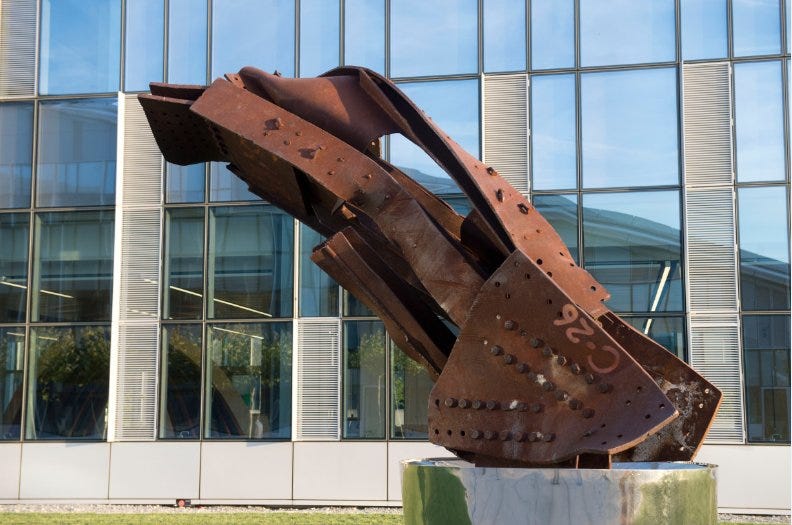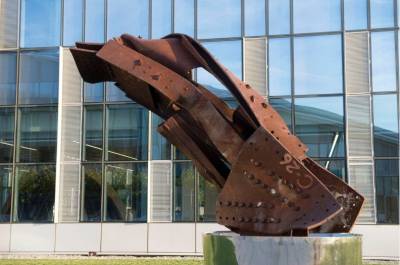A steel beam from the 107th floor of the World Trade Center’s North Tower stands on a pedestal, contorted from the impact of the airplane that crashed into it on September 11, 2001. Thousands walk past this memorial each day, reminded that terrorists murdered almost 3,000 innocent people 20 years ago this month. You might expect to see this somber display in New York City; Washington, D.C.; Shanksville, Pennsylvania; or perhaps somewhere else in the United States.
You won’t, however, find this particular memorial in the United States. It’s actually more than 3,000 miles from American shores—in Brussels, Belgium. Known as the 9/11 and Article 5 Memorial, it’s situated in Europe at the headquarters of the North Atlantic Treaty Organization.
It’s become fashionable in some American political circles to reflexively bash allies, suggesting they’re freeloaders, more trouble than they’re worth. A review of NATO’s actions after 9/11, however, demonstrates that nothing could be further from the truth.
Article 5 of the North Atlantic Treaty, from which the memorial derives its name, is the heart of the alliance’s collective-defense commitment. “An armed attack against one,” the treaty, signed in Washington, D.C., on April 4, 1949, declares, “shall be considered an attack against them all.”
After Europe generated two world wars in 25 years, NATO’s Article 5 commitment helped deter a Soviet invasion of any member state for four decades. That rightly earned NATO the reputation as one of the most successful collective-defense alliances in history. Indeed, Article 5 had never been invoked by the alliance—until 9/11. Yet, less than 24 hours after the worst terror attack in American history, that is exactly what NATO did.
Terrorists did not attack Europe on 9/11; they attacked America. Yet our NATO allies stepped forward and honored their collective-defense commitment to the United States. Lest anyone think otherwise, the Article 5 invocation was anything but an empty diplomatic maneuver. Our NATO allies demonstrated with their actions that they stood shoulder-to-shoulder with us.
On October 7, 2001, when then-President George W. Bush announced that the United States had initiated strikes against al-Qaeda and Taliban sites in Afghanistan, the United Kingdom conducted strikes too, with France, Germany, Canada, and others providing support.
One month after the attack, at Washington’s request, NATO deployed five airborne early warning and control (AWAC) aircraft and several hundred personnel to the United States to monitor any potential new airborne threats to our country. That enabled U.S. AWACs to “deploy elsewhere,” as the State Department noted.
In March 2002, special operations personnel from Canada, Denmark, France, Germany, Norway, as well as other NATO and allied countries supported the U.S.- and Afghan-led Operation Anaconda in the Shah-i-Khot Valley.
Following this immediate support in the months after 9/11, help from NATO allies did not wane or dissipate as one might have predicted. Instead, that NATO support increased dramatically.
During the last 20 years, roughly 300,000 non-U.S. NATO troops served in Afghanistan, representing every NATO member country. At one point in 2011, more than 38,000 non-U.S. NATO troops were in Afghanistan. Most significantly, more than 1,000 non-U.S. NATO service members paid the ultimate price in Afghanistan, never returning home to their families.
Despite these extraordinary sacrifices and consistent signaling from Washington that the United States wanted to withdraw from Afghanistan, NATO and many NATO member countries stuck with the United States until the American military left. When President Joe Biden announced his decision to withdraw all U.S. forces on April 14, 2021, more than 6,000 non-U.S. NATO troops were still serving in Afghanistan, including approximately 1,300 from Germany. That total number of non-U.S. NATO service members was roughly double the number of American service members serving in Afghanistan in April.
And some NATO allies remained to the last possible moment.
Amid the chaos of the evacuation at Kabul’s Hamid Karzai International Airport, Norwegians ran the field hospital used to treat the 13 Americans killed in a suicide bombing on August 26. As late as August 17, nearly 800 NATO civilian personnel remained in Afghanistan for essential tasks, including air traffic control, logistics, communications, and security during the withdrawal of U.S. forces.
None of this, of course, is to suggest that NATO is without flaws and challenges.
To be certain, many NATO allies still do not carry their fair share of the defense burden. While NATO defense spending has increased significantly since 2015, 19 of America’s 29 NATO allies still do not meet the NATO guideline of spending 2 percent of their gross domestic product on defense.
Germany’s Nord Stream II pipeline with Russia is deeply unhelpful. France frequently takes steps that undermine NATO. And Turkey’s acquisition of the S-400 surface-to-air missile system from Russia is hardly the behavior one can reasonably expect from an ally.
Despite these and other genuine challenges within the alliance, in America’s moment of need after 9/11, our NATO allies were there for us. They made a commitment to collective defense, and their word was good. In Afghanistan, they backed up their Article 5 commitment with courage, consistent action, and sacrifice.
As the preamble to the North Atlantic Treaty makes clear, NATO is an alliance focused on safeguarding “democracy, individual liberty, and the rule of law”—none of which are self-sustaining. In fact, China and Russia—whom the U.S. intelligence community assesses are more aligned with one another than they have been since the 1950s—represent an increasingly formidable authoritarian threat to the democratic principles that the transatlantic alliance cherishes.
Xi Jinping and Vladimir Putin would like nothing more than a divided and weak NATO lacking the political will, alliance unity, and military capability necessary to defend our national security interests and democratic principles.
If we want to extend to our children the freedom, prosperity, and security we have enjoyed, leaders and citizens in NATO member countries should spend more time building a unified and capable NATO alliance and less time engaging in internecine sniping that we will come to regret.
Bradley Bowman serves as senior director of the Center on Military and Political Power at the Foundation for Defense of Democracies, where Jack Sullivan is a research associate.






Please note that we at The Dispatch hold ourselves, our work, and our commenters to a higher standard than other places on the internet. We welcome comments that foster genuine debate or discussion—including comments critical of us or our work—but responses that include ad hominem attacks on fellow Dispatch members or are intended to stoke fear and anger may be moderated.
With your membership, you only have the ability to comment on The Morning Dispatch articles. Consider upgrading to join the conversation everywhere.